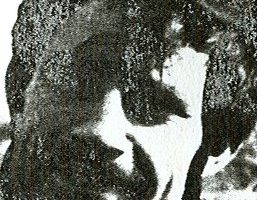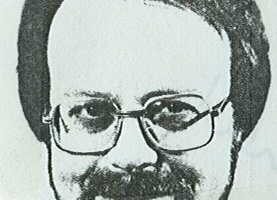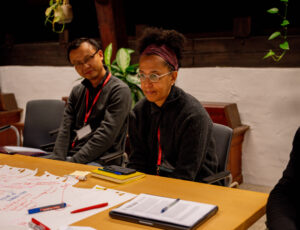
In Memoriam: Anton Blok, 1935–2024
7 October 2024Anton Blok was one of the key enthusiasts and advocates for the ideas of Norbert Elias from when Elias arrived as a Visiting Professor at the University of Amsterdam in 1968. The multidisciplinary group also included Joop Goudsblom (Sociology), Maarten Brands (History), Godfried van Benthem van den Bergh (political science, international affairs) and Abram de Swaan (polymath). I first met him at Aachen 1977 when, to mark his eightieth birthday, Elias was presented with the festschrift Human Figurations: Essays for/Aufsätze für Norbert Elias. We had both contributed essays to it. We hit it off immediately – Anton was great fun, besides being a major scholar.
I read his great book The Mafia of a Sicilian Village, 1864–1960[1] with awe. Anton had done fieldwork in western Sicily, pretending for his own safety to be studying land use there, but taking a long-term view of mafia violence. Apart from in the title of the book, he rarely spoke of ‘the Mafia’, always emphasising that mafia was a social process. He traced its origin to the legal abolition of feudalism in the brief British occupation of Sicily in the Napoleonic period. This had deprived peasants of traditional common rights, and created a large class of landless labourers, many of whom became bandits. Large landowners created private militias to guard their estates, and gradually these escaped the control of the landed magnates and developed into what came to be called mafiosi. The spirit of Elias can clearly be seen: mafia persisted because the new Italian state that emerged from the Risorgimento failed to establish an effective monopoly of the legitimate means of violence in Sicily. The process of state formation was incomplete until well within living memory. I continued to use Anton’s book in my undergraduate teaching about state formation right until I retired: it shows how much the outcome of cycles of violence can vary, shedding light for example on the long-term contrast between Ireland and England after the War of the Three Kingdoms in the seventeenth century.
I next met Anton at the conference that Eric Dunning and I organised at Balliol College, Oxford, in January 1980. This was when most of the Dutch, German and British Eliasians first really gathered together. Anton brought a number of his postgraduate students from the Katholieke Universiteit, Nijmegen (now Radboud University), where he was Professor of Anthropology. Shortly afterwards I invited him to Exeter to give a lunchtime lecture about mafia. We had lunch and then we walked across campus, with me apologising in advance that perhaps the audience would be very small. Then as we approached the lecture building, we heard a sound a bit like a distant football crowd. There was a huge turnout, and we had to switch into the largest lecture theatre available.[2]
Yet a year later, there occurred a still little understood episode in Anton’s career. The thriving ‘Amsterdam School’ had persuaded the Dutch Sociological and Anthropological Association to adopt the theory of civilising processes as the central theme for its Annual Meeting. It was a bold move because, quite apart from most anthropologists, in Dutch universities there were many other sociologists who were not greatly enamoured with Elias’s ideas, themselves adhering particularly to American schools of thought such as systems analysis and rational choice.
The scene was thus set for what became a rather fraught debate.[3] In view of Anton’s championing of Elias over the previous decade, it came as a shock when he presented a paper – sounding much closer to anthropological orthodoxy of the time – strongly critical of the term ‘civilisation’ as the opposite of ‘primitive’. Everyone knows what problems Elias created for himself, and his successors, by using the word ‘civilisation’ both in its common emic sense and in the etic sense of the technical term that he hoped to establish.[4] But he never used that crude Victorian-era dichotomy of primitive versus civilised.[5] Off the cuff in the heated debate that followed, Anton went so far as to say that Elias’s theory is not only ethnocentric, it is evolutionist, it is unilinear evolutionist, it is progressivist; and it is moreover – here we are concerned with the functions of the concept of civilisation and of the theory of civilising processes – it is moreover an aspect of a power structure, part of the apparatus of control by a powerful group, legitimising their dominance; to put it in a less friendly way, it is racist; it means that other people, other cultures, can be denied an authentic humanity.[6]
Later, Blok repeated the epithet ‘racist’ with reference to Elias’s remark (in his lecture on ‘Pacification and Violence’ at the same conference) that people in unpacified Stone Age societies in Africa must have ‘lived like wild animals’, always on the alert. Elias’s formulation was probably unwise and needlessly provocative. If he did say ‘Africa’, as Nico Wilterdink reported, one can see why that might have been a red rag to anthropological bulls. Elias was not always at his best explaining his own ideas. In the published version of this argument, which forms part of the essay ‘The fishermen in the maelstrom’,[7] he does not mention Africa, but speaks of ‘the early days of mankind’. His reported remark does not square with what he had written about Africa in his recently published essays from his time in Ghana.[8] It seems likely that he was thinking not of African societies as they were studied by anthropologists in the late nineteenth and twentieth centuries, but of early hominids to whom he was giving a lot of thought in the last decade of his life.[9]
Joop Goudsblom told me that the 1981 episode had done long-lasting damage to the Eliasian school in Amsterdam, and his previous warm relationship with Anton was never fully restored.[10] On the other hand, I think Anton’s so-called ‘apostasy’ also had a beneficial effect in stimulating Elias and several of his followers to formulate aspects of his theory more precisely. In particular, more attention was given to what I have here called the emic/etic distinction, to the contingency and reversibility of civilising processes, and to clarifying the nature of the changing balance between Fremdzwang and Selbstwang (constraint by other people versus self-constraint).
I myself did not meet Anton again until I arrived at the Netherlands Institute for Advance Study (NIAS) in 1987, when I found that he and I were both Fellows in Residence for the year. Anton was by then Professor of Cultural Anthropology at the University of Amsterdam. We soon settled back into our friendship, along with Henk Driessen, Anton’s former student and colleague at Nijmegen. But I was writing my book about Elias and, not being sure of the depth of Anton’s hostility to Elias, I rather avoided the subject with him. I need not have worried. We were sitting at lunch together one day when another anthropologist asked me some question about Elias. I hesitated for a moment, and Anton jumped in with a perfectly clear exposition of Elias’s view on whatever point it was that had been raised. Later in the year, when Carlo Mongardini came to Amsterdam to present Elias with the first Amalfi Prize, Elias insisted that Anton be invited to the small dinner that marked the occasion.
It seems to me that Anton himself continued to think like an Eliasian: even if he did not continually use the term ‘civilisation’, his thinking was always processual, which is a more decisive characteristic of Elias’s thought. One early sign was his little book on Wittgenstein and Elias,[11] subtitled ‘a methodological guideline for anthropology’, which was originally his inaugural lecture at Nijmegen. His argument has something in common with Peter Gleichmann’s idea of ‘concept avoidance’ as a key feature of Elias’s work.[12] Furthermore, although orthodox anthropology was one among many influences that promoted ‘the retreat of sociologists into the present’,[13] Anton never succumbed to that: his work was always infused with the sense of time and process.
Anton’s next major work after the mafia book was also a study of the relationship between state formation and crime. De Bokkerijders,[14] is about predatory gangsters in Limburg two decades before the Napoleonic wars, when Limburg was the southernmost, and peripheral and contested part of the Netherlands. That book unfortunately was not translated into English, but a summary of it in English is included in a collection of his essays entitled Honour and Violence.[15] The dozen essays well demonstrate his intellectual range, from chimney sweeps’ to ‘female rulers and their consorts’. His many other essays also included a notable early one in the old-established Dutch intellectual journal De Gids, about the relative autonomy of social processes as shown in Greek tragedies.[16]
Radical Innovators, dating from 2013,[17] is about radical and successful innovators in the sciences and the arts from the sixteenth century up to the present, whose extraordinary contributions, Anton argued, were related to their being social outsiders. The perspective is clearly figurational, and Elias is included in the list. His distancing from Elias was by no means complete, and in the 1990s he wrote two noteworthy essays in the Amsterdams Sociologisch Tijdschrift (the Eliasian ‘house journal’), one on the narcissism of small differences, the other on senseless and meaningful violence’.[18]
Finally, mention should be made of Niets is minder waar [Nothing is further from the truth],[19] which Nico Wilterdink describes as a ‘funny and elegant little book’, a collection of clichés and platitudes, inspired by Flaubert’s Dictionnaire des ideés reçues’. Whatever differences Anton Blok and Joop Goudsblom may once have had, they both had some literary ambitions and reputation – which is an unusual distinction among social scientists.
I have always thought of Anton with affection. He was an innovative and important scholar. How much better it would have been – and how much fun – had he remained an active presence in Eliasian circles.
Note
My thanks to Nico Wilterdink and Rod Aya, without whose help I could not have written about Anton Blok’s publications in Dutch, and to Abram de Swaan.
[1] The Mafia of a Sicilian Village, 1860–1960 (Oxford: Basil Blackwell, 1974).
[2] Rod Aya recalls a similar episode at the American Historical Association meeting in San Francisco in December 1973) where Anton gave talk on political banditry. The panel chairman was Chalmers Johnson, who remarked beforehand that he’d been told there would be a sizable audience, many in attendance for ‘reasons that will not withstand too close scrutiny’.
[3] I was not present myself at the 1981 conference and here, as in my 1989 book Norbert Elias and the Human Self-Image (later in paperback as Norbert Elias: An Introduction), pp. 228–30, I am relying on conversations with people who were there, and especially on Nico Wilterdink’s report in his article ‘Die Zivilisationstheorie in Kreuzfeuer der Discussion’, in P. R. Gleichmann, J. Goudsblom and H. Korte (eds), Macht und Zivilisation (1982), pp. 280–304.
[4] In a late essay, Elias admitted that when writing Über den Prozess der Zivilisation in the late 1930s, he had simply been unable to find another word for the etic concept that captured all the associations of the emic word. See ‘What I mean by civilisation: reply to Hans Peter Duerr, in Essays II: On Civilising Processes, State Formation and National Identity (Dublin: UCD Press, 2008 [Collected Works, vol. 15], pp. 8–23.
[5] I checked the consolidated index to Elias’s writings (Supplements and Index, Dublin: UCD Press, 2014 [Collected Works, vol. 18]), and found that he scarcely, if ever, uses the word ‘primitive’ except in relation to its use by others, notably Richard Thurnwald and Lucien Lévy-Bruhl.
[6] These words, reported by Nico Wilterdink, do not appear in the published text of Anton’s paper, ‘Primitief en geciviliseerd,’ Sociologische Gids 29 (1982): 197–209.
[7] First published in Involvement and Detachment (Dublin: UCD Press, 2007 [Collected Works, vol. 8], p. 131, originally 1983).
[8] Dieter Reicher et al. (eds), Norbert Elias’s African Processes of Civilisation: On the Formation of Survival Units in Ghana (Wiesbaden: Springer VS, 2022).
[9] I can now appreciate more vividly what Elias meant by ‘ever on the alert’: this year (2024) a young fox took up residence in our garden. I watched her, and she watched me. She plainly became not very scared of us, and would sometimes curl up and apparently go to sleep only a couple of metres away from where I was sitting reading or sipping coffee. If I moved, however, she opened one eye; if I stood up, so did she; and if there were a sudden movement or loud noise, she scarpered.
[10] Anton Blok did, however, contribute a chapter to the liber amicorum (festschrift) presented to Joop Goudsblom on his retirement: see ‘Aforistisch schrijven’, in N. Wilterdink, J. Heilbron and A. de Swaan (eds), Alles verandert: Opstellen voor en over J. Goudsblom (Amsterdam: Meulenhoff, 1997), pp. 38–42. He alludes to Goudsblom’s book of aphorisms, Pasmunt (Amsterdam: Querido, 1976).
[11] Anton Blok, Wittgenstein en Elias: een methodologische richtlijn voor de anthropolgie (Amsterdam: Athenaeum, 1976). Another of Anton Blok’s early publications was Antropologische perspectieven (Muiderberg: Coutinho, 1977), which Nico Wilterdink describes as: ‘A very erudite overview of anthropological perspectives. … His own perspective here is clearly Eliasian from the beginning to the end, although the name of Elias is mentioned only sparsely.’
[12] Peter R. Gleichmann, ‘Zur zivilisationssociologische Begriffsbildung’, in J. Diedrich et al. (eds), Sozialer Wandel in Westeuropa (Berlin: Universitätsbibliothek der Technischen Universität, 1979); cf. Elias’s criticism of sociologists’ tendency to reduce processes to states (‘process reduction’, What is Sociology? (Dublin: UCD Press, 2012 [Collected Works, vol. 5]), pp. 106–7, 175–7, and also Herbert Blumer’s classic symbolic interactionist essay ‘Science without concepts’, in his Symbolic Interactionism: Perspective and Method (Englewood Cliffs, NJ: Prentice-Hall, 1969).
[13] Norbert Elias, ‘The retreat of sociologists into the present’, in Essays III: On Sociology and the Humanities (Dublin: UCD Press, 2009 [Collected Works, vol. 16]), pp.107–26.
[14] De Bokkerijders: roversbenden en geheime genootschappen in de landen van Overmaas (1730–1774) (Amsterdam: Prometheus,1991).
[15] Anton Blok, Honour and Violence (Cambridge: Polity, 2001).
[16] See ‘Tijd en tragiek: De relatieve autonomie van klassieke romans en drama’s’, De Gids, 137 (1974); ‘Achter de coulissen’, De Gids, 140, 1977.
[17] Radical Innovators was first published in Dutch as De vernieuwers: de zegeningen van tegenslag in wetenschap en kunst, 1500–2000 (Amsterdam: Promethus Bert Bakker, 2013).
[18] ‘Zinloos en zinvol geweld’, Amsterdams Sociologisch Tijdschrift 18: 3 (1991), pp. 189–207; and ‘Het narcisme van kleine verschillen’, Amsterdams Sociologisch Tijdschrift 24: 2 (1997), pp. 159–87, both translated in Honour and Violence.
[19] Niets is minder waar: woordenboek voor de aankomende intellectueel (Amsterdam: Prometheus, 2002).



